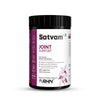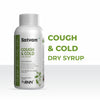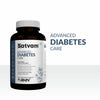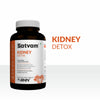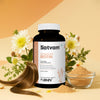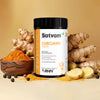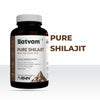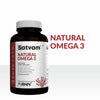Importance of vitamin B12 in humans
B12 is essential for keeping your body fit. These vegan forms of vitamin B12 will ensure that you never run out of your reserves. Every cell in your body uses vitamin B12 for metabolism, making it one of the most significant vitamins known to man.
And you know the scary part?
It turns out that a B12 deficiency is a very real danger if we don't actively monitor our intake of this vitamin. This is particularly true if you follow a plant-based diet because studies suggest that up to 92% of vegans may be deficient in this type of nutrient.
But do not worry just yet!
You're not required to switch from chickpeas to chicken right now. You can still do many things to maintain your vegan B12 levels and continue to be a healthy vegetarian. Today, we'll discuss some of the finest natural sources of B12 and how vegans can obtain it.
Sources of vitamin B12 for vegans
Since vegans abstain from all goods derived from animals, they may need to eat foods fortified with vitamin B12, such as some breakfast cereals and nutritional yeast. Vegans must find alternate sources of vitamin B12 in order to maintain their health, as plant foods do not naturally generate this vitamin.
The following list of items can be fortified with vitamin B12:
- Non-dairy milk that is fortified
- Substitutes of meat
- Breakfast cereals
- Nutritional yeast
- Spreads that are vegan
All of these foods should have labels that you carefully peruse because some of them might not be vitamin B12 fortified. If you already have a B-12 deficiency, you may need to take additional B12 in capsules or injections. You can buy Vitamin b12 supplement from Satvam Nutrition that are completely free from any type of chemicals and are completely plant-based.
Sources of vitamin B12 for vegetarians
Vegetarians who are willing to increase their intake of vitamin B12 have plants of options to choose from. Some of these foods include:
- Low-fat milk
- Yogurt
- Cheese
- Eggs
- Nutritional yeast
- Fortified cereals
A vegetarian should make sure to regularly eat enough of the following items. It is critical to comprehend how much vitamin B12 is present in these foods:
- 8 ounces of yogurt have 1.1 micrograms of vitamin B12 in them.
- 2 micrograms of vitamin B12 can be found in 1 cup of low-fat milk.
- 95 mcg of vitamin B12 can be found in 1 ounce of Swiss cheese.
- 6 mcg of vitamin B12 is present in 1 big egg.
Cereals that have been fortified are a wise option as they have a high bioavailability. In other words, vitamin B12 does not need to be metabolized before the body can receive it.
Since it is simple to add nutritional yeast to dishes while they are cooking and because it has a rich, cheesy, nutty taste, it is popular with both vegetarians and vegans. You can sprinkle nutritional yeast on food and snacks or add it to cooked dishes.
To consume nutritional yeast, you can do the following:
- Sprinkle some of it on your popcorn.
- Add in your cheese sauces.
- Add in your mashed potatoes.
- Add to a creamy soup.
- Mix in your recipes of pasta.
Also, find out Diagnosis And Kidney Support Supplement
What are the health benefits of vitamin B12?
For optimal health, a person must make sure their food contains enough vitamin B-12. The following are the benefits of consuming this nutrition:
- The division and formation of red blood cells.
- Helps to protect the nervous system.
- Provides assistance in the synthesis of a person's DNA.
- Helps in providing energy to our body.
Depending on a person's age, the suggested daily allowance B12 is as follows:
- 4 milligrams (mcg) per day for adults and adolescents.
- Children aged 9 to 13 should take 1.8 mcg every day.
- Children aged 4 to 8 should take 1.2 mcg every day.
- toddlers aged one to three: 0.9 micrograms per day
- Babies younger than 6 months old only need 0.4 mcg of B-12 per day, while infants aged 7 to 12 months need 0.5 mcg.
Women who are pregnant need 2.6 mcg per day, while nursing mothers need 2.8 mcg.
The deficiency symptoms of the nutrition
The effects of a vitamin B12 deficiency on one's health can be serious. Anemia, certain neurological disorders, and impaired development and healing are typical issues linked to vitamin B-12 deficiency.
The following are typical signs of a vitamin B12 deficiency:
- Nerve damage
- Fatigue and weakness
- Numbness
- Fever
- Sweating
- Depression
- Mood swings
- Loss of appetite
- Problem in walking
Anyone who encounters these signs and symptoms ought to schedule a medical checkup. The doctor will inquire about their symptoms and run tests to see if a vitamin B12 deficiency is to blame.
Final thoughts
Vegans and vegetarians should take precautions to make sure their diets contain enough vitamin B-12. Without keeping healthy levels of vitamin B-12, a person may experience negative side effects like depression and nerve damage.
Vegans and vegetarians should be mindful of alternative sources, such as fortified goods, as vitamin B-12 cannot be found in plant-derived foods.



